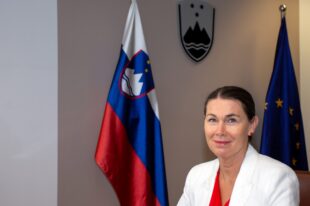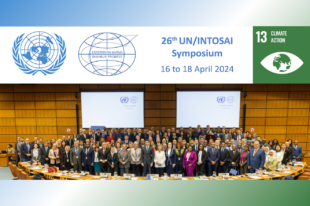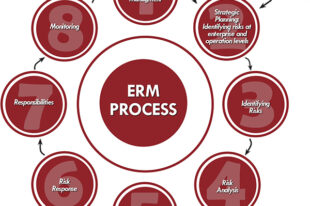Supreme Audit Institutions: Important Partners for German Development Cooperation
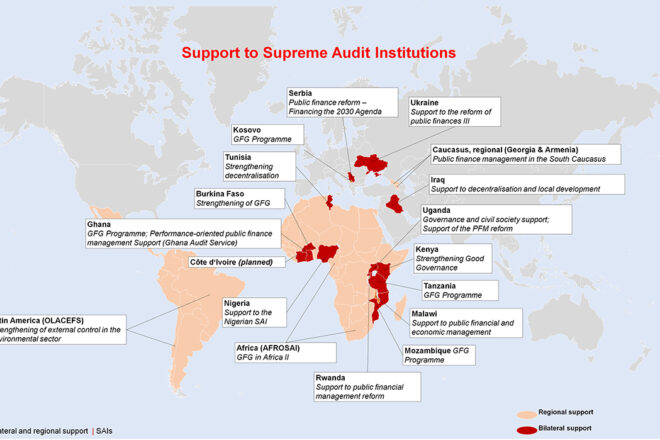

Overview
Supreme Audit Institutions (SAIs), key partners for the German Development Cooperation (GDC), strengthen Public Financial Management (PFM) system performance and are key actors in achieving the Sustainable Development Goals (SDGs). In its “Marshall Plan with Africa,” the German Federal Ministry for Economic Cooperation and Development (BMZ) has recognized the prominent roles SAIs play in safeguarding public resources.
SAI support is an essential part of GDC’s promotion of Good Financial Governance (GFG)—a holistic, systemic, and value-based approach that aims to strengthen PFM systems by combining technical expertise with normative principles and analyses of the political economy of reforms.
Portfolio
For more than 30 years, GDC has partnered with SAIs, as well as their regional organizations, such as the Organization of Latin American and Caribbean Supreme Audit Institutions (OLACEFS) and the African Organization of Supreme Audit Institutions (AFROSAI).
GDC currently (March 2020) supports SAI work through cooperation projects in 16 countries—Armenia, Burkina Faso, Georgia, Ghana, Iraq, Kenya, Kosovo, Malawi, Mozambique, Nigeria, Rwanda, Serbia, Tanzania, Tunisia, Uganda, and Ukraine—and is establishing a new cooperation with the SAI of Côte d’Ivoire.
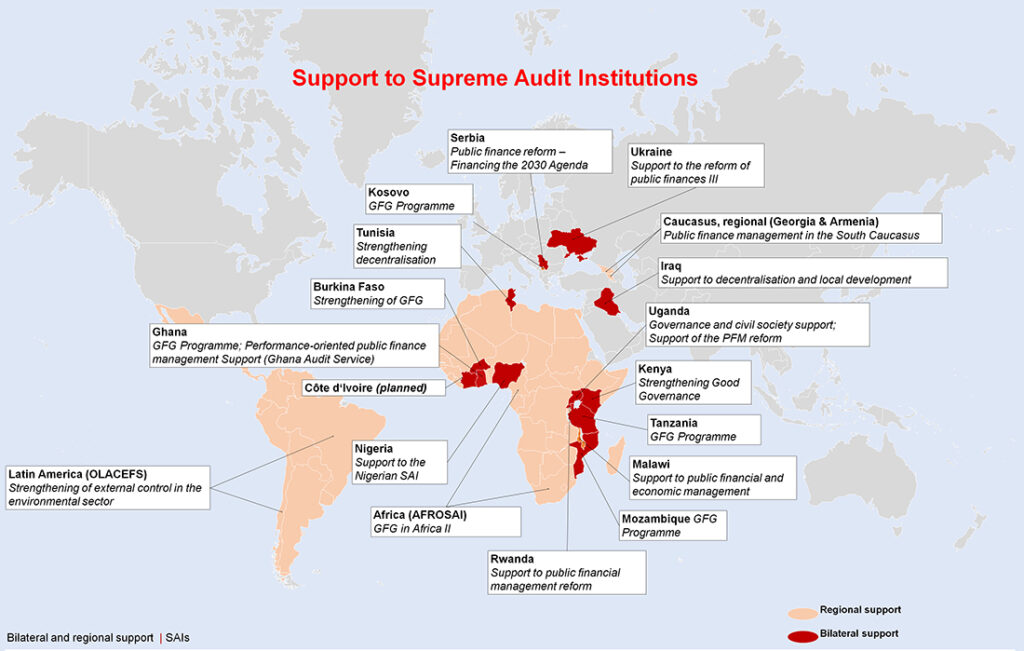
Support Approach
In its SAI support, GDC pursues a multi-level capacity development approach, a process through which people, organizations, and societies realize, strengthen, create, adapt, and maintain capacity over time and continuously realign with changing conditions. GDC combines human capacity development for auditors with support to SAIs’ organizational development. Moreover, GDC supports SAIs at the system level in fostering cooperation with other PFM actors.
Support can be channeled through financial cooperation—via the Kreditanstalt für Wiederaufbau (KfW)—as well as through technical cooperation—via the Deutsche Gesellschaft für Internationale Zusammenarbeit (GIZ) GmbH.
Support Examples
Comprehensive, Local Level Auditing in Tanzania
GDC’s technical cooperation with the National Audit Office of Tanzania (NAOT) provides a perfect example of human capacity development for auditors. Drawing on expertise from Germany’s national and regional SAIs, the NAOT trained 195 auditors in comprehensive auditing at the local level.
During the two-week training period, auditors learned to combine regularity and performance audit aspects to contract management. The trained auditors then applied these new skills on the ground by reviewing high-value construction contracts. Audit findings comprise a special chapter in the NAOT Controller and Auditor General’s annual report submitted to Parliament. As of March 2019, the NAOT issued 164 audit recommendations on Local Government Authorities management and is now undertaking comprehensive auditing independently.
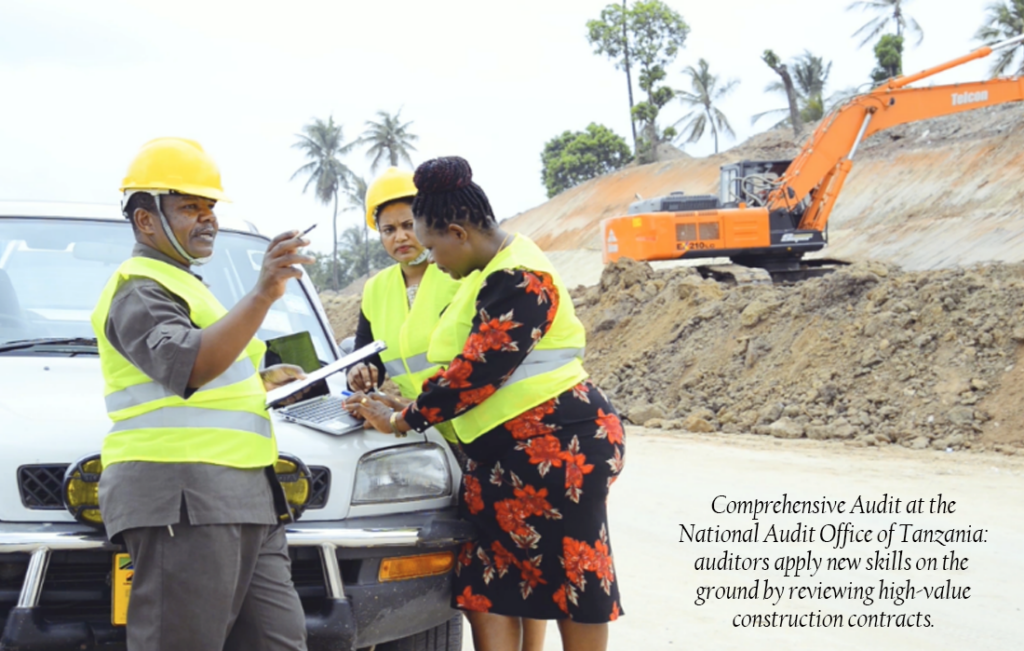
Strengthening SAI Georgia’s Mandate
Technical cooperation with SAI Georgia serves as an example of GDC organizational development support. While several organizational processes were covered in a twinning project between SAI Georgia and SAI Germany, GDC’s support focused on strengthening SAI performance auditing processes; stakeholder cooperation (such as the Parliament, Ministry of Finance, and civil society); and the SAI’s legal mandate.
As a result, Georgia’s parliament acknowledged the importance of independent external auditing for effective legislative scrutiny by adopting the new Constitution of Georgia that upgraded the State Audit Office law to organic law and granted SAI Georgia the right to address the Constitutional Court of Georgia.
Furthermore, in 2018, amendments to parliamentary rules and procedures mandated that an independent audit firm would perform the SAI’s financial audit, which was previously completed by parliament. Cooperation with the parliament was institutionalized by establishing a Budget and Finance Subcommittee with the special purpose of reviewing audit reports.
Strengthening National Accountability Systems in Ghana and Uganda
For SAIs to be efficient, effective cooperation with other PFM system actors is key. Thus, strengthening cooperation at the system level is an important aspect of GDC support to GFG.
In Ghana, technical cooperation focuses on strengthening the SAI interface with other organizations—namely the Parliament, Ministry of Finance, Internal Audit Agency, auditees, and civil society—that need to act upon the SAI’s findings and recommendations. Better cooperation and exchange help improve comprehension of the SAI’s reports, which potentially enhances impact.
Therefore, technical cooperation facilitates joint workshops to discuss the SAI’s reports and public hearings to engage ministries, departments, and agencies, as well as metropolitan, municipal, and district assemblies. GDC further supports feedback and information sharing sessions with the Internal Audit Agency on how to improve internal controls and audit committee work. Using its mandate to retrieve funds incorrectly spent, SAI Ghana recovered approximately 10.5 million Euros in 2018 by issuing 112 surcharge certificates. These amounts were previously disbursed illegally or held privately by employees, largely due to weaknesses in internal controls.
Moreover, SAI Ghana, supported by regional technical cooperation, developed “CitizensEye”, a mobile application that allows citizens to provide feedback on public service and infrastructure quality to inform the SAI’s audit planning. Within the first three months after its launch, the platform received over 500 reports, and ten investigations have already been launched, mainly with a view to improve health facility and revenue collection services.
Technical cooperation with SAI Uganda illustrates GDC support at the system level. Since 2014, technical cooperation has been supporting collaboration among the Office of the Auditor General, Inspectorate of Government, and Public Procurement, and Disposal of Public Assets Authority. Collaborative efforts, which began through increased high-level dialogue, has expanded to now include more technical aspects and operational-level officers.
Benefits include increased consultation, information sharing, and joint activity organization among the three institutions in line with organizational mandates. Collaborative efforts have also contributed to better use of each organization’s work and strengthened case referral, thus enhancing the accountability system.
German financial cooperation complements organizational strengthening by providing required infrastructure, including office buildings and information technology.
In Ghana, financial cooperation supports the SAI’s regional structure by constructing up to 25 district offices. Ghana’s national contribution supports real estate acquisition, office maintenance, as well as recruiting an additional 80 employees. With this investment, the SAI aims to increase its audit completion performance from 66% to 95% within three years after finalizing the construction.
In Uganda, financial cooperation supported implementing a digital information management system and constructing regional offices, thus supporting SAI performance and outreach.
Strengthening SAI Roles in Realizing the SDGs
GDC’s bilateral support is complemented by technical cooperation with select regional SAI groups, such as OLACEFS and AFROSAI, which provide capacity development to member SAIs, foster peer learning, and are especially well-placed to address emerging auditing issues. Regional SAI groups have been key partners in strengthening the role of SAIs in the realization of the SDGs.
In Latin America and the Caribbean, technical cooperation with OLACEFS focuses on strengthening environmental auditing through a project that contributes to enhancing auditing processes and stakeholder communications—both internal and external, including the United Nations Economic Commission for Latin America and the Caribbean, Environment Program, Department of Economic and Social Affairs, and the International Union for Conservation of Nature.

GDC supports implementing SDG-oriented cooperative audits on numerous themes, such as government preparedness to implement the 2030 Agenda, the effectiveness of protected areas in conserving biodiversity (SDG 14 and 15), and renewable energy promotion (SDG 7).
In Africa, technical cooperation with the African Organization of English-speaking Supreme Audit Institutions (AFROSAI-E) led to a SAI PFM reporting framework—a tool allowing public auditors to assess PFM process performance along the entire budget cycle. The tool assesses core PFM functions and addresses essential institutions, such as the Ministry of Finance, Parliament, and Revenue Authority, in addition to selected spending ministries and departments. Sector ministry selection, which often includes the Ministries of Education and Health, is based on potential impact in achieving the SDGs.
Outlook
Achieving GFG without high-performing SAIs is unrealistic. SAI contributions to efficient and effective PFM is essential in achieving development goals, and GDC will continue partnering with SAIs to develop capacities and further strengthen performance.

